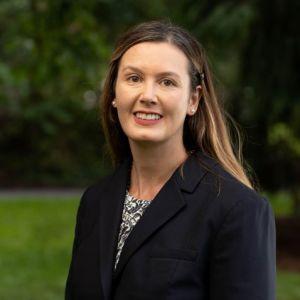Carrie McCurdy is an Associate Professor in Human Physiology at the University of Oregon. She is also the Director of the Molecular Metabolism & Endocrine Lab and is a current member of the UO Senate.
Carrie earned her Bachelor of Science Degree in Biochemistry from the University of Notre Dame. She went on to complete Ph.D. in Nutritional Sciences from the University of Wisconsin-Madison specializing in skeletal muscle biology and insulin signaling. Subsequently, Carrie completed a postdoctoral fellowship in Pediatrics/Neonatology with focused training in areas of metabolism, Diabetes, and fetal programming at the University of Colorado Anschutz Medical Campus. She joined faculty at University of Colorado Anschutz Medical Campus as an Assistant Professor in Pediatrics and directed her NIH-funded research lab from 2008-2013. Carrie joined the Department of Human Physiology at the University of Oregon in the Fall of 2013.
In her research, Carrie focuses on the cellular mechanisms causing insulin resistance and impaired metabolism and which often increase an individual’s risk for developing type 2 diabetes. Her work specifically examines at the role of early life nutrition and maternal health on the long-term health of the offspring. Other studies in the lab are focused on how insulin regulates cellular processes like GLUT4 translocation and glucose clearance. Many of these studies are collaborations with investigators at the UO and across the country and use various experimental models including cells, fish, rodents, sheep, non-human primates, and human. Research and scholarship in the Lab has been funded by National Institute of Health and new pilot projects have been supported by University of Oregon VPRI office including an Incubating Interdisciplinary Initiatives Award and UO-OHSU Collaborative Seed Award. Carrie has published over 40 peer-reviewed papers in scientific journals and contributed to scholarly books.
Carrie actively teaches undergraduate and graduate courses in Human Physiology program. She is devoted to mentoring undergraduate and graduate students in the lab and in the classroom. She actively engages in programs at the UO and through her various professional societies to enhance undergraduate research opportunities and to increase diversity and inclusion in STEM.
Back to Top

